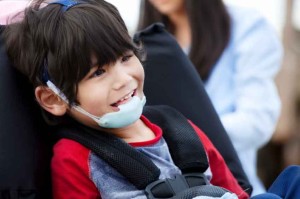Unique Transition Program Created for Disabled Young Adults
 Providing life-long care for a disabled or special needs child is no small feat. Residential programs for autistic children or those with developmental deficits range between $80,000 and $225,000 a year. The stark reality is that parents – especially those with limited financial means – have few options for their children once they are transitioning into young adults. Some just end up staying at home, while others may qualify for Medicaid-funded programs such as “day habitation,” which offers trainings in a group environment, or state-run programs that provide vocational assistance for higher-functioning individuals.
Providing life-long care for a disabled or special needs child is no small feat. Residential programs for autistic children or those with developmental deficits range between $80,000 and $225,000 a year. The stark reality is that parents – especially those with limited financial means – have few options for their children once they are transitioning into young adults. Some just end up staying at home, while others may qualify for Medicaid-funded programs such as “day habitation,” which offers trainings in a group environment, or state-run programs that provide vocational assistance for higher-functioning individuals.
The majority of disabled children who reach their early 20’s are ill-equipped to hold down a full-time job, let alone live independently. And each year, mounting numbers of children are diagnosed with autism and other cognitive deficits, adding to this already burgeoning problem.
One Massachusetts mother, tired of the lack of viable options for her 22-year old autistic son, decided to create her own program, called 3LPlace Life College. Tuition isn’t cheap – parents can expect a $132,500 bill each year, but the program has been a lifesaver for many and is the only school of its kind in the state.
3LPlace Life College for students with developmental disabilities
Part residential and part day program, Life College has filled a much-needed gap in Massachusetts, where young adults with autism have very few opportunities. The program provides comprehensive life-skills training to its participants, and follows a unique transition curriculum that was developed by experts at Tufts, Harvard and Boston universities and approved by the Department of Developmental Services.
The program’s name is based on learning, living and linking, the latter of which demonstrates the group’s dedication to sharing their successes with other cities throughout the nation.
“I always wanted a whole life for my son,” says Life College’s creator, Deborah Flaschen, who resides in Brookline. “I don’t see that he and my daughter need different opportunities.”
The program welcomes members ages 22 to 32, and strives to help them develop their own talents using a holistic approach that focuses on emotional well-being. After two or three years, members should be ready to transition into a semi-independent or fully independent living situation.
Individuals at 3LPlace are eligible for financial assistance from both public and private funding sources, though subsidies will likely not cover the entire cost. Nevertheless, the program is a boon to parents who have sacrificed years of their lives to care for their autistic or disabled child at home, who might otherwise face a grim future of home-care for an adult who is not prepared to live independently. The program also accepts young adults diagnosed with cerebral palsy and Downs Syndrome.
Recent research conducted by the American Academy of Pediatrics shows that:
- More than 50 percent of children on the autism spectrum did not attend school or hold down a job 2 years following high school
- 79 percent still lived at home with their parents
- 60 percent received some kind of therapy or counseling
- Almost 40 percent received no services or assistance
Preventable birth trauma and cognitive disabilities
Researchers are still investigating the exact causes of autism, which can lead to attention and motor coordination difficulties, in addition to physical and behavioral problems. Some studies indicate that environmental factors such as chemical exposure can cause the disorder, while others suggest this neurodevelopmental condition is purely genetic.
Other disabilities such as cerebral palsy have been tied to serious birth trauma at the time of delivery, particularly in cases where signs of fetal distress went undetected or ignored. Umbilical cord problems or a stalled delivery in which the baby suffers oxygen deprivation often leads to permanent brain damage. In the wake of such a life-altering diagnosis, many parents may wonder how such an injury could have occurred.
Regrettably, medical malpractice during prenatal checkups or at the time of delivery has been the source of many incidents of birth trauma. If developmental disabilities or cerebral palsy resulted from a preventable birth injury, families may be entitled to compensation to help offset costs for lifetime medical care and transition programs such as 3LPlace Life College.
- The Boston Globe, Making a place for disabled young adults to live, learn http://www.bostonglobe.com/lifestyle/2015/01/30/making-place-for-children-with-disabilities-when-they-age-out-state-assistance/u0UcdOmb5XKIAth8TgAtOL/story.html
- The Birth Trauma Association, What is Birth Trauma? http://www.birthtraumaassociation.org.uk/what_is_trauma.htm

 Resources
Resources
 Resources
Resources

